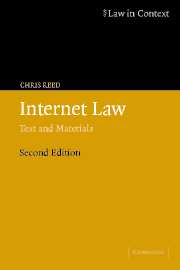Book contents
- Frontmatter
- Contents
- Preface
- Table of UK Statues
- Table of statutes–foreign jurisdictions
- Table of European Communities legislation
- Table of Conventions and Agreements
- Table of cases
- Introduction
- 1 The Internet as a distributed environment
- 2 From each according to his ability : actors and activities in the Internet world
- 3 An infinity of scarce resources : ownership and use of Internet resources
- 4 New actors on a new stage : intermediary liability in the Internet world
- 5 On the Internet, nobody knows you're a dog: identity and identification
- 6 Old wine in new bottles : traditional transactions in the Internet environment
- 7 The long arm of the law : cross-border law and jurisdiction
- 8 Legislative and regulatory arbitrage
- 9 Enforceability in the Internet environment
- 10 Facing the legislative and regulatory challenge
- Index
6 - Old wine in new bottles : traditional transactions in the Internet environment
Published online by Cambridge University Press: 05 June 2012
- Frontmatter
- Contents
- Preface
- Table of UK Statues
- Table of statutes–foreign jurisdictions
- Table of European Communities legislation
- Table of Conventions and Agreements
- Table of cases
- Introduction
- 1 The Internet as a distributed environment
- 2 From each according to his ability : actors and activities in the Internet world
- 3 An infinity of scarce resources : ownership and use of Internet resources
- 4 New actors on a new stage : intermediary liability in the Internet world
- 5 On the Internet, nobody knows you're a dog: identity and identification
- 6 Old wine in new bottles : traditional transactions in the Internet environment
- 7 The long arm of the law : cross-border law and jurisdiction
- 8 Legislative and regulatory arbitrage
- 9 Enforceability in the Internet environment
- 10 Facing the legislative and regulatory challenge
- Index
Summary
Although, as we have seen, the Internet has produced new actors and new types of transaction, much of the activity taking place via the Internet is still closely analogous to physical world dealings. This is because the Internet is merely a communications mechanism, albeit a highly sophisticated global medium, and can therefore be used to enter into traditional types of transaction. The challenge for the law is to adapt the provisions which currently regulate physical world transactions so as to provide adequate solutions to the new disputes which arise when they are carried out in electronic form.
Difficulties exist because the law has developed over a long period of time during which physical actors and physical media were the only, or at least the primary, mechanisms by which transactions with legal consequences could be effected. When the first elements of communication were dematerialised with the electric telegraph, the result of the communication was still a physical document written by a clerk on a telegram form. This enabled the courts to consider this communication technology as simply a new method of transmitting a physical letter. More recent dematerialisation technology such as the facsimile (fax) machine has been treated in the same way. Similarly, once dematerialised communications methods such as the telephone, radio and telex enabled ‘conversations’ at a distance, the courts noted that there were human actors at either end and treated these in the same way as face-to-face negotiations.
- Type
- Chapter
- Information
- Internet LawText and Materials, pp. 173 - 216Publisher: Cambridge University PressPrint publication year: 2004
- 1
- Cited by



